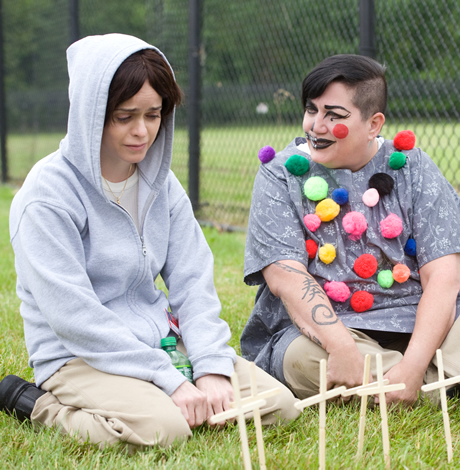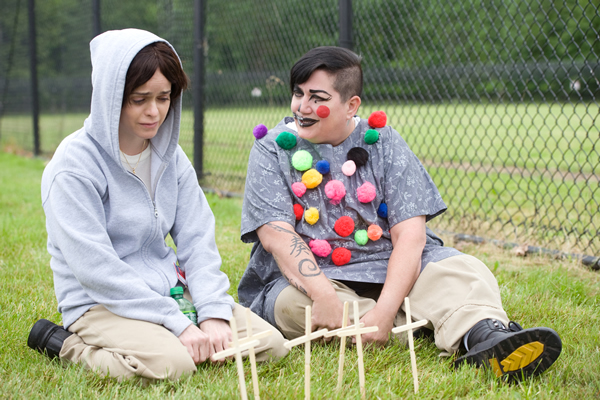Arts & Entertainment
‘Orange’ teaser
Alliances deepen on season three which debuts Monday


Taryn Manning and Lea DeLaria in season three of ‘Orange is the New Black.’ (Photo by JoJo Whilden, courtesy Netflix)
Jenji Kohan’s Netflix smash “Orange is the New Black” is back to doing what it does best: character exploration.
Season three opens with a new and (relatively) improved Pennsatucky doing her best to be more respectful of others and less uptight about vulgarity. She’s genuinely trying to better herself, and it’s incredibly satisfying to see her transformation from a villain to someone reformed and compassionate. The season builds from there and the first six episodes suggest this season will be the best, most emotionally complex, season to date.
Thankfully, the Piper/Alex drama resolves fairly quickly and focus pulls away from the two just enough to focus on other, more interesting characters while keeping Taylor Schilling as the top-billed actor. The show is able to remain fresh and captivating by not dwelling on this will they/won’t they pairing.
Litchfield has turned upside down as conditions improve for inmates. Little victories following a bed bug infestation change the attitudes of several inmates, like Red. Because only so much happiness can go around, the prison guards are getting the shaft as a change in ownership of the prison means fewer hours and slashed benefits. The question arises as to who the real prisoners are (hint: still the actual prisoners).
This shake-up is thanks in part to the addition of newcomer Mike Birbiglia’s character, who flawlessly brings a layered, subtle and mysterious performance with each line. The show also welcomes Mary Steenburgen. Like Birbiglia does to Joe Caputo, so does Steenburgen, playing former guard Mendez’s mother, complicate the pregnant Dayanara’s life. Daya, meanwhile, grows more and more isolated as she runs out of options for how to take care of her unborn baby.
Unlike season two, there is no clear primary antagonist. The “Clash of the Titans”-esque struggle between Red, Vee and Gloria has resolved, and each tribe is left to deal with the aftermath of Rosa’s escape and hit-and-run, immortalized with the mic-droppiest of lines: “Always so rude, that one.”
The show has shifted from the man vs. man-style of conflict to man vs. self. Nicky battles her addiction more than ever. Morello is depressed, having lost her job driving the van. Chang, in one of the best episodes so far, struggles with immense insecurities and loneliness. Crazy Eyes refuses to accept the loss of Vee, her mother figure. These and other internalized conflicts become more of a prison for the characters than Litchfield itself, as they fight to free themselves from their masochistic choices.
Tribe members intermix less than they have before, with the exception of Soso, who struggles to find her place in the prison. Even Chang, the other prominent Asian character, does not accept her, as Soso is part Scottish.
However, this racial isolation has given room for new bonds to form, like the budding friendship between Boo and Pennsatucky, which began at the end of season two. The unlikely pairing of the unapologetic lesbian and the religious zealot proves to be among the most delightful relationships of the new season. They help each other accept their past mistakes, learn from them and grow. They’ve each toned down their respective idiosyncrasies and welcome each other as friends and equals. Boo’s intellectualism and Pennsatucky’s emotional side complement each other well and they somehow find within the other a support system.
One of the more heartbreaking character explorations focuses on Marisol “Flaca” Gonzalez (Jackie Cruz). We learn the reason for her teardrop tattoo and the guilt she carries. In one episode, her story comes full circle. The promise of a new job assignment quickly changes from a symbol of hope to one of futility, as she ends up right back where she started before being sent to prison. While others thrive under the new administration, she’s lost her light. It’s a powerful moment for Cruz, who has shown she can dominate a scene just as well as Laverne Cox, who is tragically underused this season.
With each season, “Orange” explores themes surrounding motherhood, and season three is no exception. Can bad actions define a good mother? Can a mother’s best intentions still fail to help her daughter? How does motherhood transcend blood bonds? What happens when we have no parental figures to turn to and we’re left on our own? While conflicts in season three are much more internalized than in previous seasons, they are no less thrilling.
Some of the best bits are tips of icebergs that suggest a much more complex story waiting to be unraveled in a future episode. When the enigmatic Blanca Flores attends the “book funeral” (a necessary book burning following the bed bug infestation), she explains sadly that she prefers reading over living her own life. But as always, when things seem darkest in Litchfield, there’s always hope tomorrow will be taco night.

Team DC, the umbrella organization for LGBTQ-friendly sports teams and leagues in the D.C. area, held its annual Night of Champions Awards Gala on Saturday, April 20 at the Hilton National Mall. The organization gave out scholarships to area LGBTQ student athletes as well as awards to the Different Drummers, Kelly Laczko of Duplex Diner, Stacy Smith of the Edmund Burke School, Bryan Frank of Triout, JC Adams of DCG Basketball and the DC Gay Flag Football League.
(Washington Blade photos by Michael Key)




















The 2024 National Cannabis Festival was held at the Fields at RFK Stadium on April 19-20.
(Washington Blade photos by Michael Key)
















Covering the @NatlCannaFest at RFK Stadium for @WashBlade . Stop by the LGBTQ+ booth and pick up a paper if you are here. pic.twitter.com/is7hnsaPns
— Michael Patrick Key (@MichaelKeyWB) April 20, 2024
Theater
‘Amm(i)gone’ explores family, queerness, and faith
A ‘fully autobiographical’ work from out artist Adil Mansoor

‘Amm(i)gone’
Thorough May 12
Woolly Mammoth Theatre
641 D St., N.W.
$60-$70
Woollymammoth.net
“Fully and utterly autobiographical.” That’s how Adil Mansoor describes “Amm(i)gone,” his one-man work currently playing at Woolly Mammoth Theatre.
Both created and performed by out artist Mansoor, it’s his story about inviting his Pakistani mother to translate Sophocles’s Greek tragedy “Antigone” into Urdu. Throughout the journey, there’s an exploration of family, queerness, and faith,as well as references to teachings from the Quran, and audio conversations with his Muslim mother.
Mansoor, 38, grew up in the suburbs of Chicago and is now based in Pittsburgh where he’s a busy theater maker. He’s also the founding member of Pittsburgh’s Hatch Arts Collective and the former artistic director of Dreams of Hope, an LGBTQ youth arts organization.
WASHINGTON BLADE: What spurred you to create “Amm(i)gone”?
ADIL MANSOOR: I was reading a translation of “Antigone” a few years back and found myself emotionally overwhelmed. A Theban princess buries her brother knowing it will cost her, her own life. It’s about a person for whom all aspirations are in the afterlife. And what does that do to the living when all of your hopes and dreams have to be reserved for the afterlife?
I found grant funding to pay my mom to do the translation. I wanted to engage in learning. I wanted to share theater but especially this ancient tragedy. My mother appreciated the characters were struggling between loving one another and their beliefs.
BLADE: Are you more director than actor?
MANSOOR: I’m primarily a director with an MFA in directing from Carnegie Mellon. I wrote, directed, and performed in this show, and had been working on it for four years. I’ve done different versions including Zoom. Woolly’s is a new production with the same team who’ve been involved since the beginning.
I love solo performance. I’ve produced and now teach solo performance and believe in its power. And I definitely lean toward “performance” and I haven’t “acted” since I was in college. I feel good on stage. I was a tour guide and do a lot of public speaking. I enjoy the attention.
BLADE: Describe your mom.
MANSOOR: My mom is a wonderfully devout Muslim, single mother, social worker who discovered my queerness on Google. And she prays for me.
She and I are similar, the way we look at things, the way we laugh. But different too. And those are among the questions I ask in this show. Our relationship is both beautiful and complicated.
BLADE: So, you weren’t exactly hiding your sexuality?
MANSOOR: In my mid-20s, I took time to talk with friends about our being queer with relation to our careers. My sexuality is essential to the work. As the artistic director at Dreams of Hope, part of the work was to model what it means to be public. If I’m in a room with queer and trans teenagers, part of what I’m doing is modeling queer adulthood. The way they see me in the world is part of what I’m putting out there. And I want that to be expansive and full.
So much of my work involves fundraising and being a face in schools. Being out is about making safe space for queer young folks.
BLADE: Have you encountered much Islamophobia?
MANSOOR: When 9/11 happened, I was a sophomore in high school, so yes. I faced a lot then and now. I’ve been egged on the street in the last four months. I see it in the classroom. It shows up in all sorts of ways.
BLADE: What prompted you to lead your creative life in Pittsburgh?
MANSOOR: I’ve been here for 14 years. I breathe with ease in Pittsburgh. The hills and the valleys and the rust of the city do something to me. It’s beautiful, it’ affordable, and there is support for local artists. There’s a lot of opportunity.
Still, the plan was to move to New York in September of 2020 but that was cancelled. Then the pandemic showed me that I could live in Pittsburgh and still have a nationally viable career.
BLADE: What are you trying to achieve with “Amm(i)gone”?
MANSOOR: What I’m sharing in the show is so very specific but I hear people from other backgrounds say I totally see my mom in that. My partner is Catholic and we share so much in relation to this.
I hope the work is embracing the fullness of queerness and how means so many things. And I hope the show makes audiences want to call their parents or squeeze their partners.
-

 South America4 days ago
South America4 days agoDaniel Zamudio murderer’s parole request denied
-

 Maryland5 days ago
Maryland5 days agoMontgomery County police chief discusses arrest of trans student charged with planned school shooting
-

 Commentary5 days ago
Commentary5 days agoWorld ‘isn’t much different today’
-

 State Department19 hours ago
State Department19 hours agoState Department releases annual human rights report











